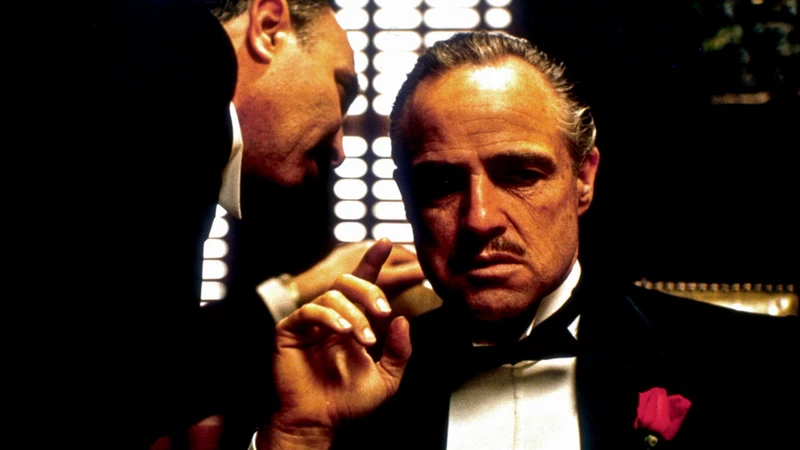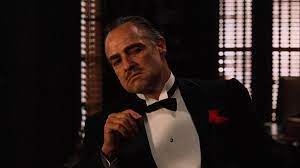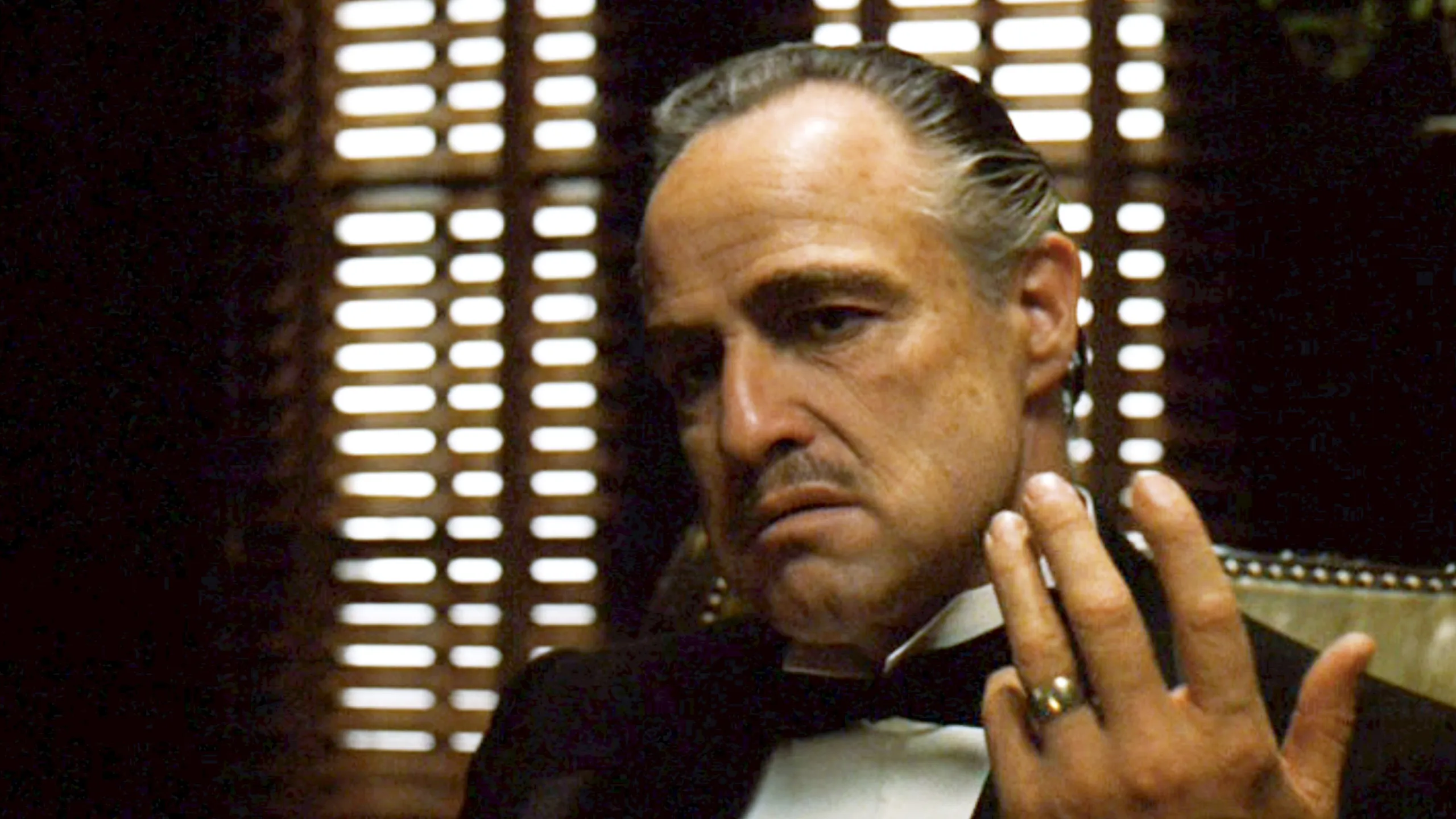🎬 The Godfather (1972)
- thaiduong
- January 6, 2025

Review of The Godfather (1972)
The Godfather (1972), directed by Francis Ford Coppola and based on the novel by Mario Puzo, is widely regarded as one of the greatest films in cinematic history. This crime epic tells the story of the Corleone family, a powerful Mafia dynasty in post-war America, and explores themes of power, loyalty, corruption, and family. With its masterful direction, iconic performances, and unforgettable score, The Godfather transcends the crime genre, offering a profound meditation on morality and the American Dream.
Plot Overview:
The story revolves around the Corleone family, led by patriarch Vito Corleone (Marlon Brando). As Vito ages, his youngest son, Michael (Al Pacino), reluctantly becomes involved in the family business. Initially an outsider to the Mafia world, Michael undergoes a dramatic transformation from a decorated war hero to a ruthless crime boss.
The narrative spans Vito’s struggles to maintain his empire amid growing threats from rival families and Michael’s rise to power following an attempt on Vito’s life. As Michael takes over, his moral descent and the devastating effects of his choices on those around him are depicted with heartbreaking clarity. The film culminates in a chilling sequence where Michael solidifies his control over the Corleone empire, severing the last remnants of his former life.
Performances:
- Marlon Brando as Vito Corleone: Brando’s portrayal of Vito Corleone is iconic, characterized by his quiet authority, gravelly voice, and understated power. Vito’s mix of paternal warmth and ruthless pragmatism makes him a complex and fascinating character. Brando’s performance earned him an Academy Award for Best Actor, cementing his place as one of the greatest actors in film history.
- Al Pacino as Michael Corleone: Al Pacino delivers a career-defining performance as Michael, capturing his evolution from a principled young man to a cold and calculating leader. Pacino’s restrained intensity and nuanced portrayal anchor the film, particularly in Michael’s pivotal moments of transformation and moral conflict.
- James Caan as Sonny Corleone: Caan brings fiery charisma to Sonny, the hot-headed eldest son whose impulsiveness contrasts sharply with Michael’s calculated demeanor. Caan’s portrayal adds emotional weight to the film, particularly in Sonny’s tragic downfall.
- Robert Duvall as Tom Hagen: Duvall is exceptional as Tom Hagen, the family’s consigliere and adopted son. His calm, measured performance provides a counterbalance to the Corleone brothers’ more volatile personalities.
- Diane Keaton as Kay Adams: Keaton plays Kay, Michael’s outsider wife, whose growing unease with Michael’s transformation adds a poignant layer to the narrative. Her performance highlights the emotional toll of life within the Corleone family.
Themes:
- Family and Loyalty: At its core, The Godfather is a story about family. The film explores the bonds of loyalty that hold the Corleone family together, even as those same bonds lead to betrayal and violence. The juxtaposition of familial love and criminal ruthlessness creates a compelling dynamic.
- Power and Corruption: The film examines the corrupting influence of power, particularly through Michael’s arc. His initial reluctance to join the family business gives way to a ruthless pursuit of control, illustrating how power can erode morality and humanity.
- The American Dream: The Godfather critiques the idea of the American Dream, presenting the Corleones’ criminal empire as a metaphor for ambition and success in a flawed system. Vito’s rise to power and Michael’s consolidation of it reflect both the opportunities and the moral compromises inherent in pursuing the dream.
- Tradition vs. Modernity: The film contrasts old-world values, represented by Vito, with the changing landscape of organized crime and American society. This tension underscores much of the conflict between characters and sets the stage for Michael’s ascension.

Cinematic Style:
- Direction: Francis Ford Coppola’s direction is masterful, blending epic storytelling with intimate character moments. His ability to balance the grandeur of the Corleone empire with the personal stakes of each character creates a film that is both sweeping and deeply human.
- Cinematography: Gordon Willis’ cinematography is legendary, characterized by its use of shadows and warm, sepia tones to evoke a sense of timelessness and foreboding. The visual style enhances the film’s themes, creating an atmosphere of both elegance and menace.
- Score: Nino Rota’s haunting score is integral to the film’s emotional impact. The iconic main theme is both mournful and majestic, perfectly capturing the film’s mix of beauty and tragedy.
- Dialogue: The script, co-written by Coppola and Puzo, is filled with iconic lines that have become part of pop culture, including “I’m gonna make him an offer he can’t refuse” and “Leave the gun. Take the cannoli.” The dialogue is sharp, evocative, and deeply character-driven.
Reception and Legacy:
Upon release, The Godfather was met with universal acclaim, winning three Academy Awards, including Best Picture, Best Actor (Marlon Brando), and Best Adapted Screenplay. It has since been hailed as one of the greatest films of all time, celebrated for its influence on both cinema and popular culture.
The film redefined the gangster genre, elevating it from pulpy entertainment to a vehicle for exploring profound themes. It inspired countless filmmakers and remains a benchmark for storytelling, character development, and craftsmanship
Final Thoughts:
The Godfather (1972) is a cinematic masterpiece that combines gripping storytelling, brilliant performances, and impeccable craftsmanship. It transcends the crime genre, offering a profound exploration of power, morality, and family. Francis Ford Coppola’s vision, combined with the unforgettable performances of its cast, makes The Godfather a timeless work of art that continues to captivate audiences and influence filmmakers worldwide. It’s not just a movie—it’s an experience that leaves an indelible mark on anyone who watches it.











